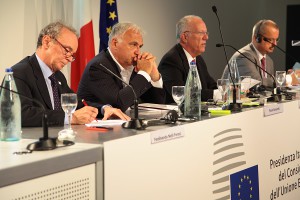 The European Commission agenda is focusing on growth and job to recover 350 million investments and 4 millions of jobs, lost because of the crisis. The European Commission is urging Member States to recognize the central importance of industry for creating jobs and growth, and of mainstreaming industry-related competitiveness concerns across all policy areas. This is the key message of the communication ‘For a European Industrial Renaissance’, adopted on 22 January 2014.
The European Commission agenda is focusing on growth and job to recover 350 million investments and 4 millions of jobs, lost because of the crisis. The European Commission is urging Member States to recognize the central importance of industry for creating jobs and growth, and of mainstreaming industry-related competitiveness concerns across all policy areas. This is the key message of the communication ‘For a European Industrial Renaissance’, adopted on 22 January 2014.
The Commission calls on the Council and the Parliament to adopt proposals on energy, transport, space and digital communications networks, as well as to implement and enforce legislation to complete the internal market. Furthermore, industrial modernization must be pursued by investing in innovation, resource efficiency, new technologies, skills and access to finance, accelerated by the use of dedicated EU funds. The Communication promotes a more business-friendly Europe through actions to simplify the legislative framework and improve the efficiency of public administration at EU, national and regional levels. Other key issues include easier access to third country markets through harmonisation of international standards, open public procurement, patent protection and economic diplomacy.
During Manifacturing Renaissance conference, ambassador and designed commissioner for Industry and Enterpreneurship of European Commission Ferdinando Nelli Feroci (the first from left to right) pointed out the key actions of the new industrial strategy of European Union: “We are working on regulation to support competitiveness, access to credit and training programs to offer companies skilled workers”. Regarding finance, COSME is the EU programme for the Competitiveness of Enterprises and Small and Medium-sized Enterprises (SMEs) running from 2014 to 2020 with a planned budget of €2.3bn.
The European Union is emerging from its longest-ever recession. EU28 GDP grew by 0.2% in the third quarter of 2013. The upturn in business sentiment and confidence indicators suggests that structural reforms, macroeconomic governance improvements and measures in the financial sector have succeeded in stabilising Europe’s economy. The EU is on the right track, but the recovery remains modest, with Commission forecasts of 1.4% GDP growth for the EU28 in 2014 and unemployment rates close to 11% for the next two years. That is why fostering growth and competitiveness to sustain and strengthen recovery and to achieve the goals of the Europe 2020 agenda have become the top priority for the Commission and EU Member States.
The crisis has underlined the importance of the real economy and a strong industry. Industry’s interactions with the rest of Europe’s economic fabric extend far beyond manufacturing, spanning upstream to raw materials and energy and downstream to business services (e.g. logistics), consumer services (e.g. after-sales services for durable goods) or tourism. Industrial activities are integrated in increasingly rich and complex value chains, linking flagship corporations and small or medium enterprises (SMEs) across sectors and countries.
The economic importance of industrial activities is much greater than suggested by the share of manufacturing in GDP. Industry accounts for over 80% of Europe’s exports and 80% of private research and innovation. Nearly one in four private sector jobs is in industry, often highly skilled, while each additional job in manufacturing creates 0.5-2 jobs in other sectors. The Commission considers that a strong industrial base will be of key importance for Europe’s economic recovery and competitiveness.
Overall, EU industry has proved its resilience in the face of the economic crisis. It is a world leader in sustainability and returns a EUR 365 billion surplus in the trade of manufactured products (EUR 1 billion a day),generated mainly by a few high- and medium-technology sectors. They include the automotive, machinery and equipment, pharmaceuticals, chemicals, aeronautics, space and creative industries sectors, and high-end goods in many other sectors, including food.



